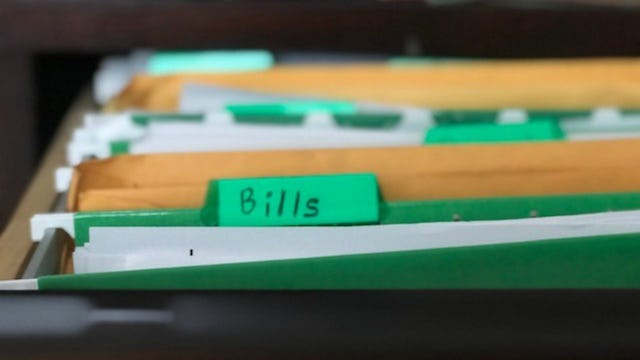I Have Health Insurance, But I'm Still Drowning In Medical Debt

It’s enough to keep you lying awake at night, the tears and stress causing your heart to race. It’s on my mind every single day, even nearly six years later. When you become pregnant, you probably think about the financial side of raising a child. But everything always seems to work out. Unless life doesn’t go as planned. As a parent who has faced infertility, child loss, and premature birth, I’m drowning in medical debt. And I know I’m not alone.
The billing department doesn’t care whether your baby died or whether your child has cancer. The medical companies don’t care whether you’re on unpaid leave because your child is a long-term patient. It doesn’t matter whether your child requires in home nurse visits or therapy. You still have to pay. And even with good insurance, the bills add up.
I’ve gone through a range of emotions over the years. I felt frustration that my insurance wouldn’t cover $14,000 in fertility treatments. I found myself angry as I tried to reason with radiology companies, hoping for a discount after my son died. And I felt sad and hopeless as the bills kept racking up, unsure of how we would ever dig ourselves out.
And here’s the truth–we still haven’t. My husband and I have great jobs. We had our financial plan in place when we became pregnant, but we didn’t account for the tragedy that was about to unfold.
Stacey Skrysak
Between me and my triplets, we spent six months in the hospital. I faced emergency surgeries, an ICU stay and the unfortunate delivery of my babies more than 17 weeks premature. We faced a lengthy NICU stay, emergency surgeries and we faced the death of two our children within a two month span. As we balanced the grief of losing our children with trying to stay to stay strong for our survivor, we also faced the stress of mounting medical bills. Each blood transfusion, each X-ray, each day in an isolette all added up to the tune of millions of dollars. And while I’m beyond grateful that we have insurance and a maximum out of pocket cap, we still face tens of thousands of dollars in bills. Even years later.
Because here’s the reality—those medical bills don’t end when you leave the hospital. The first few years were filled with a revolving door of specialists, therapists and other medical visits. We spent money on equipment like oxygen and monitors for our NICU miracle. We had echocardiograms to check our daughter’s healing heart, doctor appointments to check her eyes post-surgery and nurses making house calls to administer shots and check on our child. We even faced the challenge of childcare, our daughter far too fragile to be around other children, yet neither my husband nor I could afford to quit our jobs to stay home. And because of our income, we never qualified for any assistance.
The sight of hundreds of bills is enough to make you nauseous. For years, I found myself wide awake in the middle of the night, wondering when the bills would end. I poured through the fine print on each bill and we took a hard look at our finances, finding ways to cut corners and pay down our debt. And over time, a new sense of reality sank in.
Stacey Skrysak
I realized that life doesn’t always go as planned, but that’s OK. You just have to learn to adapt when you are dealt a different hand. I no longer stare at the stacks of bills, wondering why me? Instead, I find myself grateful for the gift of life, no matter how short it may be.
That emergency surgery on my 14-ounce son saved his life. And while he eventually passed away, that bill is a reminder of the extra month we were given with him. Without that surgery, he would have passed that same day. My pricey hospital stay came complete with a near death experience, but it also gave me a new perspective on life, reminding me that tomorrow is never promised. And those bills that keep pouring in for our surviving triplet? They are a reminder of all that our miracle child has overcome.
You may not see my family taking extravagant trips or redecorating our house anytime soon. We’re responsible parents with thousands of dollars in medical bills to pay. But that’s OK. We are happy and healthy, and our lives are rich because of it.
This article was originally published on